Newsletter
Tuning Into the Year of the Snake
Published
3 months agoon

Featured image created by Xiaohongshu user “小罗Design”, title:《🥟饺子里的温暖 —— 回家过年》/ “The Warmth of a Dumpling – Going home for the Chinese New Year”
PREMIUM NEWSLETTER | ISSUE #45
Overview:
▶ Dear Reader – Watching the CMG Gala
▶ What’s on Weibo Chapters – 15 Years of Weibo
▶ What’s Popular – The “China Chic Girl” & Sketchy Takeout Food
▶ What’s Noteworthy – China’s Artificial Sun
▶ What’s Memorable – “The Spring Festival Survival Toolkit”
▶ Weibo Word of the Week – Fake Foreigners
Dear Reader,
This week, trending topics in China were dominated by two themes: Trump and the Chinese New Year. Unsurprisingly, it’s clear which of the two is the most significant for most people: the Spring Festival and the journey home. The phrase “回家” (huí jiā), meaning “returning home,” has been flooding social media in recent days.
The Chinese New Year, or the Spring Festival, falls on January 29 this year, welcoming the Year of the Snake. Spring Festival is the most important time of the year for family reunions, and for some, it’s the only time of the year to be together. The travel home, whether by car, plane, or train, often comes with sentimentality and melancholy. Adult children who lead important and busy professional lives suddenly find themselves transformed into their parents’ “babies” again, getting stuffed with food and peppered with endless questions.

“Going home” visualized by Xiaohongshu users through AI and digital images.
Although it is a joyous occasion, the social aspect of the Chinese New Year is not welcomed by everyone. On apps like Xiaohongshu, netizens are publishing guides on how to survive the celebrations, and the term “Spring Festival Social Anxiety” (春节社交焦虑) pops up frequently. Younger people, in particular, who want to avoid questions about their personal lives—such as their work, marital status, or income—often feel stressed out by family reunions and the pressure of not meeting their family’s expectations. For years, netizens have been sharing the questions they dread the most.
Spring Festival Gala: The Ultimate Distractor
But there is one major ray of light during the long Chinese New Year’s Eve, it’s the show everybody loves to hate but still watches—the China Media Group (CMG) Spring Festival Gala. As the ultimate distractor, it captivates millions of households, providing a much-needed escape from awkward conversations and family pressures.
Better known as Chunwan (春晚), the Spring Festival Gala is one of the world’s most-watched live televised events. Lasting a total of four hours, roughly from 8pm to 1am Beijing time, it has been annually broadcasted since 1983 and has become an integral part of the Chinese New Year’s Eve. While many young people consider the show corny and old-fashioned, it has become deeply ingrained in China’s social media culture, where complaining about the show on Weibo has become its own New Year tradition.
Since 2016, I’ve annually live-blogged the entire show from start to finish. Unfortunately, I won’t be able to do so this year as I’ll be on the road, but here are some key pointers on what to pay attention to.
Mixing Official Propaganda with Entertainment
📺 First, you might ask: why should you watch the Gala at all? One reason is its sheer viewership and the chance to be part of a collective experience. Last year, over 420 million people reportedly watched the show, generating billions of mentions across social media platforms.
🇨🇳 An even better reason, though, is to see what the show is highlighting. As CMG is under the direct control of the Central Propaganda Department of the Chinese Communist Party, the Gala serves as an important moment for the Party to convey its official ideology, promote traditional culture, and showcase the nation’s top performers. While it’s also a commercial event, the Gala remains highly political, mixing official propaganda with entertainment.
Watching the entire show from start to finish be a bit much, but keeping an eye on the key highlights and noteworthy moments is definitely worth your time. It offers insights into important themes across culture, entertainment, politics, diplomacy, and even military affairs.
🪖 For example, last year’s Gala drew attention with the performance of the PLA song “Decisive Victory” (决胜). Delivered by artists from the PLA Cultural and Artistic Center, the performance featured soldiers in combat gear marching and dancing, with a backdrop of rockets, tanks, and war-like scenes. Taiwanese media framed the song as a reflection of mainland China’s military stance toward Taiwan, and some Weibo users interpreted it similarly. The performance gained further attention because it followed a duet of the song “Etiquette” (礼序) sung by performers from both Taiwan and mainland China, interpreted by some as a statement of “diplomacy comes before violence” (先礼后兵).
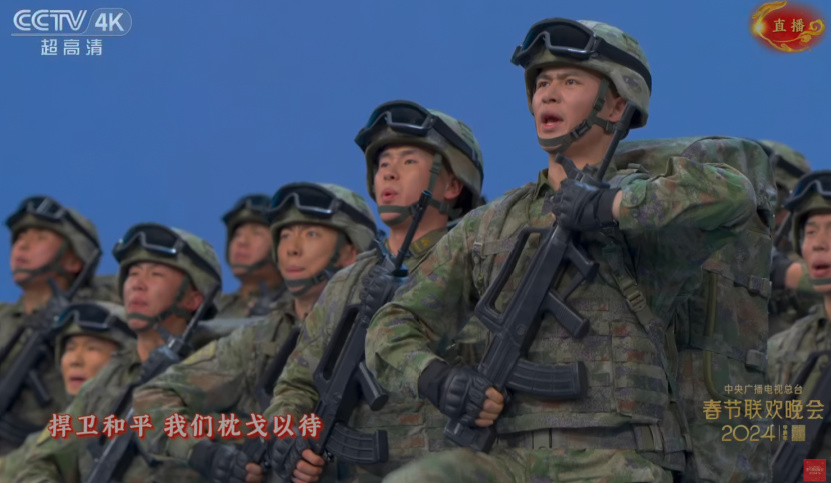
🏔️ This year’s Gala will not only feature performances from Beijing but also sub-venues in Wuhan, Lhasa, Wuxi, and Chongqing. For these cities, it’s a valuable opportunity to promote local culture and attract more tourists.
🤖 In recent years, the Gala has also become a platform to showcase China’s innovative digital technologies. In 2021, the show explicitly branded itself as a “tech innovation event” by incorporating 8K ultra-high-definition video, AI+VR studio technologies, and cloud-based performance coordination. This year, expect even more cutting-edge tech, including virtual production, 3D effects, and advanced AI, to bring Chinese cultural performances to life while underscoring China’s role as a global tech leader.
🧏♂️ Notably, this year’s Gala will feature audio-described and sign language versions for the first time, making it accessible to visually and hearing-impaired audiences. Sign language interpreters, using AR virtual technology, will appear in the Gala studio alongside the live broadcast. A split-screen feature will show both the live program and the interpreters, supported by AI-generated subtitles for hearing-impaired viewers. This marks a significant step toward a more inclusive approach by state media.
📕 One of this year’s key sponsors is Xiaohongshu (aka Rednote), an app that has recently dominated headlines as a surge of “TikTok refugees” migrated to its platform. Partnering with the Spring Festival Gala is a major traffic and visibility boost, making this one of Xiaohongshu’s most commercially successful years since its 2013 launch.
👩🏻 Also noteworthy: for the third time in a row, the Gala is directed by female director Yu Lei (于蕾), who also directed the 2024 and 2023 Gala. The 46-year-old Yu Lei previously also served as the general scriptwriter and overall designer for the Gala. The past year has really been a flourishing year for female directors in China, from cinema to TV, where female directing talent has been more visible and successful than ever before. This rise of female talent is also reflected in the Gala’s top creative team consists of 19 people: 11 of them are female.
📽 By now, the last rehearsal of the show has already been completed. The entire show is usually completely rehearsed a total of five times before Chinese New Year’s Eve. These rehearsals are recorded and almost nothing ever goes wrong during the live show – besides some bad lipsyncing here and there – since the recording is running at the same time so that producers can always switch to a pre-recorded act.
🔶️ On January 28, the show will also air via various channels, from CCTV to Bilibili, and also via Youtube here. The entire programme is usually released a day before.
Happy watching! Wishing you all joy, prosperity, plenty of dumplings, and good health in the Year of the Snake.
Best,
Manya
(@manyapan)
What’s on Weibo Chapters

Last week, I shared the first deep dive of What’s on Weibo Chapters with you. This month, our theme is 15 Years of Weibo. This week, Sinologist and China correspondent Casper Wichmann shares his insights on Weibo’s evolving role in shaping public opinion, its key moments, and whether it can remain a major platform for public discourse in China’s increasingly crowded digital landscape. At the University of Copenhagen, Wichmann previously researched Sina Weibo as a new public sphere on the Chinese internet.
With Weibo now 15 years old, we asked Wichmann about three things:
📌 Weibo’s evolving role in shaping public opinion: Has it become more or less effective, and has its social impact shifted? Which news stories highlight Weibo’s continued relevance or its changing influence?
📌 Changing government strategies on the Weibo platform: What pivotal moments stand out when Weibo emerged as a political tool?
📌 Weibo’s present & future in a crowded digital landscape: Can it still compete as a major platform for public discourse, or is it transitioning into a new role altogether?
Read this feature article to find out what Casper had to say about this:
What’s Popular

– by Ruixin Zhang
“What should we order for dinner?” is a daily dilemma for millions of Chinese consumers in one of the world’s largest food delivery markets. With numerous platforms, cuisines, menus, and discount options, choosing the right takeout—one that is tasty, affordable, and safe—can feel like a daunting task.
But these days, many Chinese people follow a simple rule to identify bad takeout: if your delivery comes in packaging featuring a playful young woman wearing sunglasses, a traditional Peking opera headdress, and holding a fan—often with the bold trendy character “潮” (cháo, meaning “trend”)—it’s likely to be an unhealthy meal with potential food safety risks.

As one netizen joked, “I was so excited for my takeout, only to see this lady on the package and feel my heart sink.” Why does this seemingly cheerful cartoon figure has come to evoke so much distrust and dislike?
This story starts in 2020, when digital illustrator @YUMI created the “China-chic Girl” image in response to a client’s request for a design that embodied the “China-chic” (国潮, guócháo) aesthetic.
China-chic, or guócháo—literally meaning “national tide”—refers to the rise of Chinese domestic (fashion) brands that often incorporate culturally Chinese elements into contemporary designs. This trend emerged as a reflection of growing nationalist sentiment in China, offering a Chinese counterpart to popular Japanese or Korean-inspired styles. From fashion and makeup to milk tea, ‘China-chic’ quickly became a defining element of China’s consumer culture (read more here).
However, when YUMI’s client failed to pay, she chose to release the design for free public use. YUMI’s creation—a blend of traditional Peking opera elements and modern sunglasses—struck a chord with its simple yet iconic charm. Its accessibility made it even more appealing, and the China-chic Girl soon became the go-to design for restaurants looking for affordable, visually striking takeout packaging.
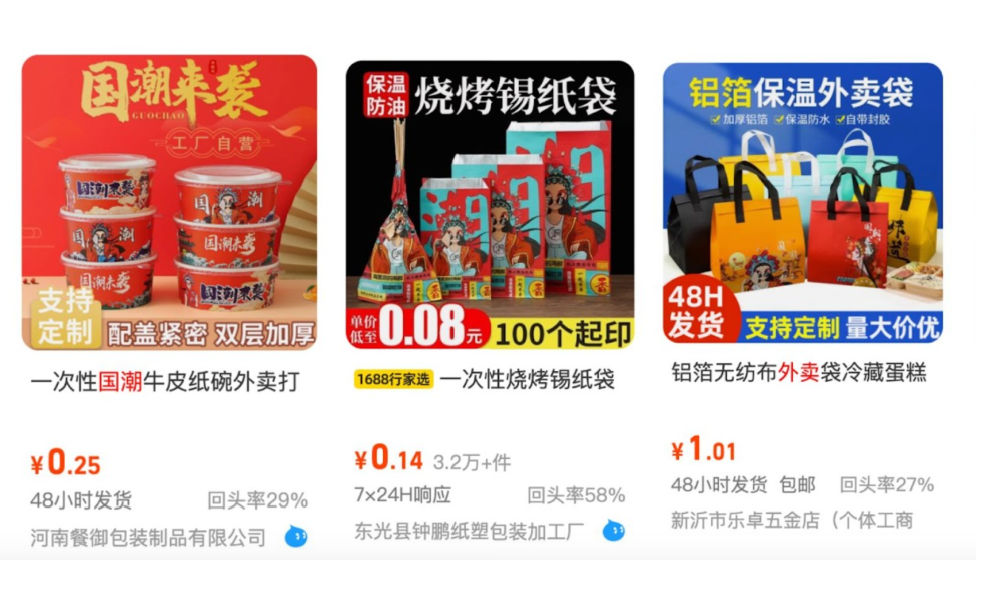
On China’s wholesale website 1688, you can find a wide range of cheap takeout packaging with the “China-chic girl” on it.
The China-chic Girl was all the rage, until last fall.
Starting in September, some delivery drivers began exposing filthy kitchen conditions on social media, warning customers to avoid takeout from certain restaurants after witnessing food safety issues and kitchen hazards while waiting for orders.
Over time, people began noticing a pattern: the dirtiest kitchens were often small, non-chain establishments with no physical storefronts—just cramped spaces dedicated solely to takeout. Operating on tight budgets, these businesses often chose the inexpensive China-chic girl packaging to cut costs, unintentionally associating the China-chic girl with unsanitary and unsafe food practices.
As a result, netizens—especially young people who heavily rely on food delivery—started compiling guides to help each other avoid sketchy takeout options. The warning signs? Restaurants offering “cashback for good reviews” or those that lack a proper storefront, often listing only food items instead of a real restaurant name. These red flags point to private kitchens, poorly managed spaces, or even unregulated food safety practices. Additionally, many of these ‘China-chic takeouts’ thrive within the “group-buying” model on food delivery platforms.
The “group-buying” model, popularized by platforms like Temu and its Chinese counterpart Pinduoduo (拼多多), allows users to invite friends, family, or colleagues to purchase a product together at a discounted price.
This strategy has since evolved into a pseudo-group-buying model, where even without inviting others, the group-buying discount is still applied. These discounts are carefully calculated by platforms to ensure that, even at reduced prices, profits can still be made due to the high sales volume.
Both Meituan (美团) and Eleme (饿了么)—the two largest food delivery platforms in China—have adopted this approach by introducing budget-friendly services such as Pinhaofan (拼好饭) and Pintuan (拼团) to target lower-tier markets.
For example, a typical 30 RMB ($4.15) takeout might cost only half that price through these services, with additional platform coupons and new user discounts making it almost irresistibly affordable.
But, of course, there’s no such thing as a free lunch. As many users have discovered, getting a full meal for under 10 RMB ($1.40) often comes at the expense of quality. These Pinhaofan takeouts commonly feature pre-made dishes with indistinguishable ingredients, flimsy utensils that can’t even scoop rice, a box of suspicious juice full of artificial coloring, low-grade packaging, and, of course, that cheap, once-iconic China-chic design.
(Want to know more? There’s more to know on how “China chic girl” has gone from being a playful symbol of pride in domestic products to representing the problems of China’s fast and cheap takeout industry: read the rest of the article here.)
What’s Noteworthy

Since the week was filled with headlines about Trump’s inauguration, you might have missed another major event: the breakthrough of China’s “Artificial Sun,” a nuclear fusion reactor, which broke its own record and brought humanity closer to achieving near-limitless clean energy. Online, this milestone was celebrated as a sign of China’s growing technological and scientific leadership, with many envisioning a future of carbon-free energy led by China.
The record was set on January 20, when the Chinese Experimental Advanced Superconducting Tokamak (先进实验超导托卡马克实验装置), or EAST, operated stably for 1,066 seconds. EAST is a nuclear fusion reactor located at the Hefei Institute of Physical Science in Anhui province, designed to generate clean and sustainable nuclear energy.
EAST is often called the “Artificial Sun” because it mimics the process that powers stars—fusing hydrogen atoms to release vast amounts of energy in the form of heat. During this experiment, EAST generated temperatures exceeding 100 million degrees Celsius—around seven times hotter than the Sun’s core. This new record surpassed the previous one of 403 seconds, also set by EAST in 2023, by more than double.
This “triumph” sparked widespread excitement on platforms like Weibo. Hashtags such as “Artificial Sun Sets 1 Billion Degrees for 1,000 Seconds” (#人造太阳创1亿摄氏度1000秒纪录# ) and “China’s Artificial Sun Makes Major Breakthrough” (#中国的人造太阳有重大突破#) made it into the top trending lists. Notably, some netizens framed the achievement within the context of global technology competition, proudly highlighting China’s progress as surpassing that of the US and EU.
What’s Memorable

As the 2017 Chinese New Year approached, a humorous and unique song went viral on Chinese social media. It captured the pressure young people face when bombarded with nagging questions from family and relatives during the Spring Festival.
Composer Jin Chengzhi (金承志) and his choir, The Rainbow Chamber Singers (上海彩虹合唱团), won the hearts of Chinese netizens with their hit song “What I Do Is For Your Own Good” (春节自救指南, literally: The Spring Festival Survival Toolkit). A perfect pick for this week’s archive spotlight—check out the explanation and video via the link below.
Weibo Word of the Week

Fake Foreigners | Our Weibo phrase of the week is 仿冒外国用户账号, fǎngmào wàiguó yònghù zhànghào, meaning “fake foreign user accounts” or “user accounts that pretend to be foreigners.”
The phrase came up in a Weibo hashtag last week that attracted over 210 million views (#抖音已处理1万多仿冒外国用户账号#), about Douyin, the Chinese version of TikTok, having dealt with more than 10,000 fake foreign accounts in the wake of the “TikTok Refugee” trend.
In case you missed it (though you probably didn’t): With a TikTok ban looming in the US (briefly taking effect last Sunday before being delayed), millions of American TikTok users began migrating to other platforms this month. The most notable was the Chinese social media app Xiaohongshu (also known as Rednote), which saw a huge influx of so-called “TikTok refugees” (TikTok难民). Many were searching for what they believed to be a “Chinese version of TikTok” (read more about the story here). Seeing Xiaohongshu’s success, Douyin, the actual Chinese version of TikTok, also opened its registration process to international users.
What started as a protest against the TikTok ban and US policies turned into a surprising celebration of cultural exchange. Chinese and American netizens found a digital space to interact and connect—on the Chinese internet.
However, the hype also brought its downsides. Black market groups quickly jumped on the trend, looking to profit by gaining followers and click traffic. They created thousands of fake “foreign” accounts by reposting videos or even crafting AI-generated foreign personas.

Is the painting moving, or is this just another fake foreigner?
This phenomenon has fueled skepticism among Chinese internet users—already wary of online scams—about connecting with strangers online. One netizen joked, “Don’t buy anything from people and don’t make new friends, and you’ll never be scammed.”
Others commented: “Xiaohongshu and Douyin’s teams must be swamped these days. Meanwhile, Weibo is nice and quiet in comparison!”
This is an on-site version of the Weibo Watch newsletter by What’s on Weibo. Missed last week’s newsletter? Find it here. If you are already subscribed to What’s on Weibo but are not yet receiving this newsletter in your inbox, please contact us directly to let us know.
Stories that are authored by the What's on Weibo Team are the stories that multiple authors contributed to. Please check the names at the end of the articles to see who the authors are.

You may like
Newsletter
IShowSpeed in China: Streaming China’s Stories Well
Published
3 weeks agoon
March 30, 2025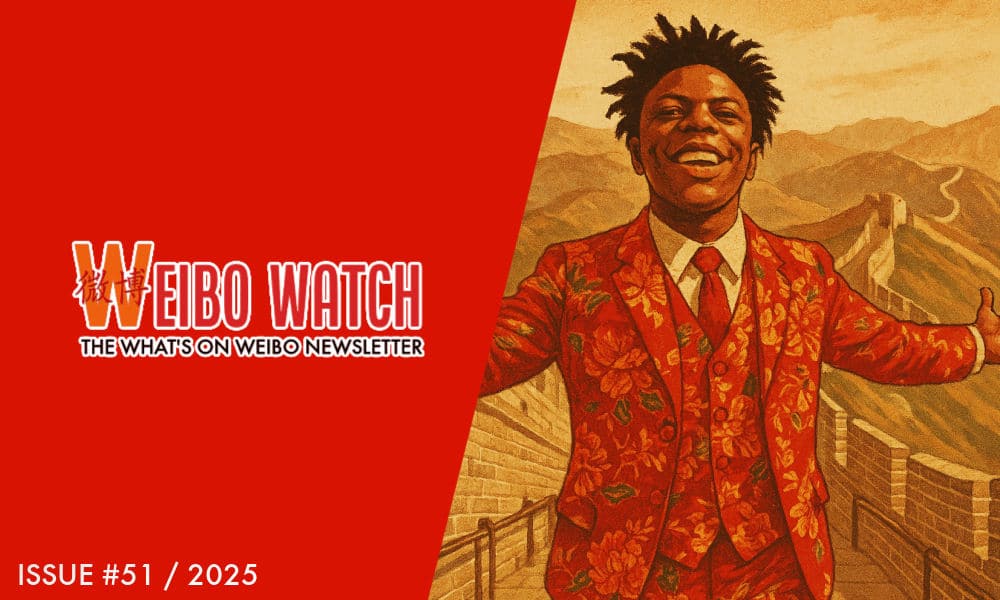
“This man is doing God’s work. In just six hours, he eliminated all Western media propaganda about China,” Chinese influencer Li Sanjin (李三金) said in one of his videos this week. The man he referred to, allegedly doing ‘God’s work,’ is the American YouTuber and online streamer Darren Watkins, better known as IShowSpeed or Speed, who visited China this week and livestreamed from various locations.
With 37 million followers on his YouTube account, Watkins’ visit hasn’t exactly flown under the radar. His streams from China have already accumulated over 17.5 million views on YouTube alone, and he also became the talk of the week on Chinese social media.
In China, the 20-year-old IShowSpeed is known as Jiǎkànggē (甲亢哥), or “Hyper Bro,” since the immensely popular YouTube star is known for being highly energetic.
Although IShowSpeed is originally known for soccer and gaming-related content, he’s been streaming live from various countries over the past year, from Ecuador to Bolivia, from Australia to Indonesia, from Romania to Japan, and also from the Netherlands, where a mob of fans harassed the YouTuber to such an extent that the influencer fled and panicked, until the police intervened and asked him to shut down the livestream for safety reasons — which he did not comply with.
It was not the only time IShowSpeed’s visit got chaotic. He also got into trouble during livestreams from other countries. While streaming from Norway, he injured his ankle and was swarmed by a crowd while trying to get out. In Greece and Indonesia, he had to ask for police support as well. In Thailand, he crashed a tuk-tuk into a temple wall.
In China, IShowSpeed’s livestreams went far more smoothly, and netizens, state media, and other official channels raved about his visit and its favorable portrayal of the country and its culture.
🔹 Symbol of Cultural Exchange & Positive Diplomacy
“Jiǎkànggē” became one of the viral terms of the week, on Weibo, Kuaishou, Douyin, and Toutiao. During his China trip, the livestreamer hit several YouTube milestones — not only breaking the 37 million subscriber mark while on stream, but also surpassing the magic number of 10 million views in total.
Watkins, also known for being (sometimes aggressively) loud and chaotic, suddenly emerged as a symbol of cultural exchange and positive diplomacy. The past week saw hashtags such as:
#️⃣”IShowSpeed gives young foreigners a full-window view into China” (#甲亢哥给国外年轻人开了全景天窗#)
#️⃣”IShowSpeed’s Shanghai livestream breaks Western filter on China” (#甲亢哥上海直播打破西方对中国滤镜#)
#️⃣”American influencer IShowSpeed amazed by stable wifi on China’s high-speed train” (#美国网红甲亢哥被高铁稳定网络震惊#)
#️⃣”IShowSpeed praised deep tried tripe for being incredibly delicious” (#甲亢哥赞爆肚太好吃了#), or
#️⃣ “IShowSpeed bridges the cultural divide” (#甲亢哥弥合文化鸿沟#).
While in Chinese media, Watkins was lauded for shining a positive light on China, this message was also promoted on English-language social media, where he was praised by the Chinese embassy in the US (#驻美大使馆称赞甲亢哥中国行#), writing:
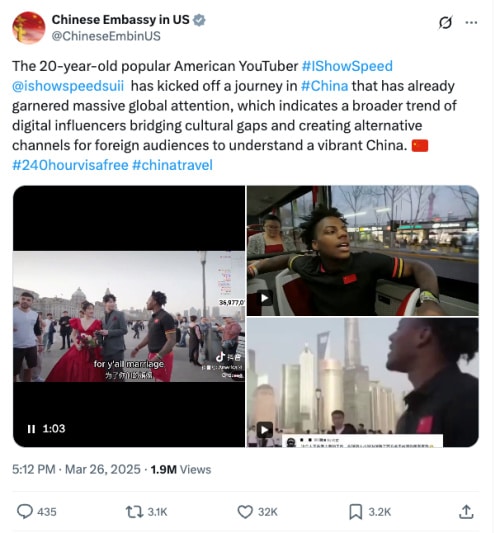
Post by Chinese Embassy in the US on X, March 26.
“This 20-year-old American internet star is bridging cultural gaps through digital means and creating new channels for foreign audiences to better understand China.”
So what exactly did IShowSpeed do while in China?
On March 24, Watkins livestreamed from Shanghai. He wandered around the city center, visited a KFC, danced with fellow streamers, stopped by a marriage market, ate noodles, played ping-pong, had hotpot, joined a dragon dance group and got acquainted with some traditional Chinese opera performance, and walked along the Bund.

On March 26, he streamed from Beijing, starting in Donghuamen before briefly entering the Forbidden City—dressed in a Dongbei-style floral suit. He later took a stroll around Nanluoguxiang and the scenic Houhai lake, rode a train, and finally visited the Great Wall, where he did backflips.

In his stream on March 28, Watkins traveled to Henan to visit the famous Shaolin Temple in Dengfeng, hoping to find a master to teach him kung fu. He trained with Shaolin monks—footage that quickly went viral.
Lastly, on March 29, he opened his own Weibo account and published his first post. On Douyin, he shared a video of his visit to Fuxi Mountain in Zhengzhou, featuring the popular “Stairway to Heaven” tourist spot.
On social media, many viewers were captivated by the content. One major talking point was the remarkably strong internet connection that allowed him to livestream for six-hour stretches without losing signal in Shanghai. (Though his Beijing stream started off patchier, the drop was minor.) For many, it symbolized the quality of China’s 5G services.
Foreign viewers also praised how safe, friendly, and clean the country appeared, and how his streams highlighted various aspects of Chinese culture—from everyday people to traditional arts and local cuisine.
🔹 Telling & Spreading China’s Stories Well
It is no wonder the success of the Jiǎkànggē livestreams is celebrated by Chinese official media in an age where China’s foreign communication aims to increase China’s international discourse power, shaping how the world views China and making that image more credible, more respectable, and more lovable.
That’s not just an observation — it’s an official strategy. Introduced by Xi Jinping in 2013, “Telling China’s Story Well” (“讲好中国故事”) is a political slogan that has become a key propaganda strategy for China and continues to be a priority in finding different ways of promoting Chinese culture — new ways of telling China’s story in the social media age – while countering Western dominant narratives about China.
In increasingly digitalized times, it is not just about telling China’s story well, but also spreading China’s message effectively — preferably through genuine and engaging stories (Cai 2013; Qiushi 2021).
Especially young, non-official ‘storytellers’ can make China’s image more relatable and dynamic. One major example, highlighted in a 2022 case study by Zeng Dan (曾丹), is Chinese influencer Li Ziqi (李子柒). You’ve probably heard of her, or seen snippets of her videos: she creates soothing, cinematic content depicting China’s countryside lifestyle, focused on cooking, crafts, and gardening. With 26 million followers on YouTube, Li Ziqi became a viral sensation who successfully communicated an authentic and appealing ‘China story’ to a broad global audience.

Li Ziqi in one of her YouTube videos.
Although the calm and composed Li Ziqi and the loud, chaotic IShowSpeed couldn’t be more different, they have some things in common: both have large international fanbases, including their millions of YouTube subscribers; they offer perspectives that differ from Chinese state media or official channels; and they have the capacity not just to tell China’s story well, but to spread it effectively through videos and livestreams.
🔹 Spontaneous Stream or Scripted Propaganda?
IShowSpeed’s China streams have triggered a wave of responses from fans and viewers, sparking discussions across international social media and even making newspaper headlines.
In English-language online media spheres, there appear to be a range of perspectives on Watkins’ China trip:
📌 One prominent view—also echoed by various foreign influencers on YouTube and other platforms—is that IShowSpeed’s visit counters “Western media lies” about China and has successfully shown the “real China” through his livestreams. The Shanghai-based media outlet Radii claimed that “IShowSpeed’s China Tour is doing more for Chinese Soft Power than most diplomats ever could.”
📌 Others challenge this narrative, questioning which dominant Western portrayals of China IShowSpeed has actually disproven. Some argue that the idea of China being a “bleak place with nothing to do where people live in misery” is itself a false narrative, and that presenting IShowSpeed’s livestreams as a counter to that is its own form of propaganda (see: Chopsticks and Trains).
📌 There are also those who see Watkins’ trip as a form of scripted propaganda. To what extent were his livestreams planned or orchestrated? That question has become one of the central points of debate surrounding the hype around his visit.
These rumors have been addressed by cameraman Slipz (@shotbyslipz), who took to X on March 28, 2025. Slipz posted that the team is “(..) not making political content, not any documentary and no journalism,” and later added: “Fact: amount of money IShowSpeed has received from Chinese Government = $0.”

But does the fact that IShowSpeed did not receive money from the Chinese government mean that it wasn’t also a form of China promotion?
➡️ Organized — it definitely was. Any media trip in China has to be. IShowSpeed would have needed a visa, he had translators with him, and throughout the streams it’s evident that local guards and public security officers were present, walking alongside and helping to keep things under control, especially in crowded areas and at major tourist spots — from Nanjing Road in Shanghai to an entire group of guards seemingly accompanying the entourage in the Forbidden City.
One logistical “advantage” to his visit was the fact that YouTube is blocked in China. While some Chinese fans do bypass the Great Firewall to access the platform, IShowSpeed remains far less known in China than in many other countries — a factor that likely contributed to how smoothly the streams went and helped prevent chaos. The team also launched a Douyin account during the trip, where he now has over two million followers. (To stream directly to their 37 million followers on YouTube, Watkins’ team either needed a VPN to access WiFi or had arranged roaming SIM cards to stay connected.)
➡️ Was it staged? Many parts clearly weren’t: casual public conversations, spontaneous barber visits in both Shanghai and Beijing (with barbers looking unsure of how to handle the situation), and wholesome fan encounters. There was even a moment when Watkins walked into a public restroom and forgot to mute the sound.
But other parts of the trip were undeniably staged — or at least framed to appear spontaneous. When visiting a marriage market in Shanghai, for instance, two actors appeared, including one woman with a sign stating she was looking for someone “capable of doing backflips.”
When Watkins took a “random” ride in what was described as the fastest car in China — the Xiaomi SU7 Ultra — the vehicle appeared to be conveniently parked and ready.
Similarly, when the streamer “ran into” Chinese-American TikTok influencer Miles Moretti (李美越) in Beijing, it turned out to be the person who would give him the now-iconic bright Dongbei flower suit and accompany him on his journey.

The ping-pong, the kung fu, the Peking opera, the hotpot, the Forbidden City tour — it all plays into the kinds of experiences that official channels also like to highlight. While likely planned by Watkins’ team in coordination with local partners, it was all far more orderly and tourism-focused than, for example, Watkins’ chaotic visit to the Netherlands.
Watkins and his entourage were also well-informed about the local dos and don’ts. At one point, Watkins even mentions “following the rules,” and when Moretti tells him mid-stream that “somebody very important lives on our left,” Watkins asks “Who?” — but the camera zooms out and the question goes unanswered, suggesting they may have been reminded that certain names or topics were off-limits (judge the moment for yourself here).
The livestream didn’t always go exactly the way Watkins wanted, either. When he attempted to take more random walks around the city, the crew appeared to be informed that some areas were off-limits, and he was asked to return to the car to continue the trip (clips here and here).
🔹 The “Nàge” Song
One major talking point surrounding IShowSpeed’s China livestreams was “the N-word.” No, not that N-word — but the Chinese filler word “nàge” or “nèige” (那个). Like “uhm” in English or “eto” in Japanese, “nàge” is a hesitation marker commonly used in everyday Mandarin conversation. It also functions as a demonstrative pronoun meaning “that.”
The word has previously stirred controversy because of its phonetic resemblance to a racial slur in English. In 2020, an American professor at the University of Southern California’s Marshall School of Business was even temporarily suspended after using the word during an online communications class — some students misunderstood its context and took offense.
The word — and the song “Sunshine, Rainbow, White Pony” (阳光彩虹小白马) by Chinese singer Wowkie Zhang (大张伟), which repeatedly features the word nàge in its chorus — popped up multiple times during Watkins’ trip. The catchy tune essentially became the theme song of his visit.
The first nàge moment actually already appeared within the first five minutes of Watkins’ Shanghai stream, when a Chinese comedian approached him on the street, trying to recall a joke. “What?!” Watkins reacted, with laughter in the background. “That’s not a joke, you said n**! It’s my first five minutes in China!” he exclaimed, before patting the man’s back in a friendly gesture, clearly not offended.
🔄 It resurfaced again within the first hour when Watkins visited a marriage market and one of the performers sang the Wowkie Zhang song. Watkins initially acted shocked, then demanded they sing it again — only to burst out laughing and start singing along.
🔄 Later, he sang the song again with a street saxophonist and encouraged others to join in.
🔄 At other moments, he played up the drama again, feigning anger when a crowd broke into the chorus, and it became a recurring gag throughout the streams.
These incidents all seem staged. One of the main reasons Watkins is known to many netizens in China is because of an older video clip showing his exaggerated reaction to the nàge song — dating back to at least 2022. So while it may have looked spontaneous, Watkins was already familiar with the word and the viral song long before his China trip.The attention given to the nàge ‘controversy’ was likely amplified for views and engagement.
While Watkins was clearly in on this part of the show — as with others — he also seemed genuinely, and at times amusingly, unaware of many things in China. He repeatedly referred to RMB as “dollars,” mistook elderly women for retired YouTube streamers, and even assumed that a woman livestreaming near the Forbidden City was reading his chat and trying to collaborate with him — although she seemed totally uninterested and was just minding her own business.
🔹 A Win-Win Situation
In the end, IShowSpeed’s visit highlighted two sides effectively doing their job. Watkins and his team successfully arranged a YouTube trip that generated high ad revenue, attracted millions of new subscribers, and boosted his brand and global fame.
On the Chinese side, there was clearly coordination behind the scenes to ensure the trip went smoothly: avoiding controversy, ensuring safety, and showcasing positive aspects of Chinese culture. From traditional opera and kung fu to ping pong, IShowSpeed’s content gave center stage to the kinds of cultural highlights that align closely with China’s official narratives and tourism goals. Even if the government didn’t pay the YouTuber directly, as his team has emphasized (and there’s no reason to doubt them), the trip still fit seamlessly into China’s soft power strategy.
IShowSpeed’s China visit has created a unique media moment that resonates for several reasons: it’s the encounter of a young modern American with old traditional China; it is a streamer known for chaos visiting a nation known for control. And it brings different benefits to both sides: clicks and ad revenue for IShowSpeed, and free foreign-facing publicity for China.
No, IShowSpeed didn’t undo years of critical Western media coverage on China. But what his visit shows is that we’ve entered a phase where China is becoming more skilled at letting others help tell its story — in ways that resonate with a global, young, online audience. He didn’t do “God’s work.” He simply did what he always does: stream. And with China’s help, he streamed China very well.
There’s so much more I want to share with you this week — from Chinese reactions to the devastating Myanmar earthquake, to a recent podcast I joined with Dutch newspaper De Telegraaf (link in Dutch, for those interested). But it also happens to be my birthday today, and I’m really hoping to still grab some birthday hotpot — so I’ll wrap this up here. I’ll keep you informed on the other trends in the next newsletter.📨.
Best,
Manya
(@manyapan)
References:
Cai, Mingzhao 蔡名照. 2013. “Telling China’s Stories Well and Spreading China’s Voice: Thoroughly Studying and Implementing the Spirit of Comrade Xi Jinping’s Important Speech at the National Conference on Propaganda and Ideological Work [讲好中国故事,传播好中国声音——深入学习贯彻习近平同志在全国宣传思想工作会议上的重要讲话精神].” People’s Daily 人民日报, October 10. http://politics.people.com.cn/n/2013/1010/c1001-23144775.html. Accessed March 29.
Qiushi 求是网. 2021. “Xi Jinping: Telling China’s Story Well, Spread China’s Voice Well [习近平:讲好中国故事,传播好中国声音].” Qs Theory, June 6. http://www.qstheory.cn/zhuanqu/2021-06/02/c_1127522386.htm. Accessed March 29.
Zeng Dan 曾丹. 2022. “How to Tell China’s Story Well: Taking Li Ziqi as an Example [如何讲好中国故事——以李子柒为例].” Progress in Social Sciences 社会科学进展 4 (1): 10–19. https://doi.org/10.35534/pss.0401002.
What’s Featured

Quite terrifying and interesting, as this trending story touched upon so many different issues.
What started as a single snarky comment on Weibo spiraled into an online witch hunt, exposing not just some dark sides of online Kpop fandom but also, most importantly, the vulnerabilities in China’s digital privacy.
Read the story, the latest by Ruixin Zhang 👀
This is an on-site version of the Weibo Watch newsletter by What’s on Weibo. Missed last week’s newsletter? Find it here. If you are already subscribed to What’s on Weibo but are not yet receiving this newsletter in your inbox, please contact us directly to let us know.
Newsletter
Weibo Watch: The Great Squat vs Sitting Toilet Debate in China🧻
This week, the Catch-22 of sitting versus squat toilets sparked heated discussion on Weibo after a Beijing News article exposed the messy reality of sitting toilets in Beijing malls.
Published
4 weeks agoon
March 23, 2025
PREMIUM NEWSLETTER | ISSUE #50
Dear Reader,
Shoe prints on top of the toilet seat are never a pretty sight. To prevent people from squatting over Western-style sitting toilets, there are some places that will place stickers above the toilet, reminding people that standing on the seat is strictly forbidden.

For years, this problem has sparked debate. Initially, these discussions would mostly take place outside of China, in places with a large number of Chinese tourists. In Switzerland, for example, the famous Rigi Railways caused controversy for introducing separate trains with special signs explaining to tourists, especially from China, how (not) to use the toilet.
Squat toilets are common across public areas in China, especially in rural regions, for a mix of historical, cultural, and practical reasons. There is also a long-held belief — backed by studies (like here or here) — that the squatting position is healthier for bowel movements (for more about the history of squat toilets in China, see Sixth Tone’s insightful article here).
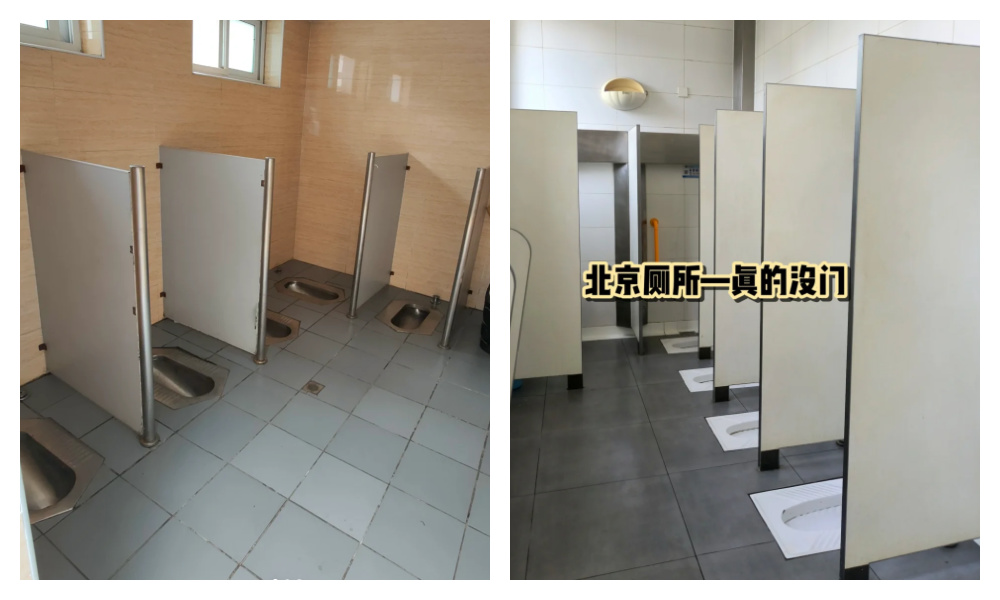
Public squatting toilets in Beijing, images via Xiaohongshu.
Without access to the ground-level squat toilets they are used to — and feel more comfortable with — some people will climb on top of sitting toilets to use them in the way they’re accustomed to, seeing squatting as the more natural and hygienic method.

Not only does this make the toilet seat all messy and muddy, it is also quite a dangerous stunt to pull, can break the toilet, and lead to pee and poo going into all kinds of unintended directions. Quite shitty.

Squatting on toilets makes the seat dirty and can even break the toilet.
Along with the rapid modernization of Chinese public facilities and the country’s “Toilet Revolution” over the past decade, sitting toilets have become more common in urban areas, and thus the sitting-toilet-used-as-squat-toilet problem is increasingly becoming topic of public debate within China.
The Toilet Committee and Preference for Sitting Toilets
Is China slowly shifting to sitting toilets? Especially in modern malls in cities like Beijing, or even at airports, you see an increasing number of Western-style sitting toilets (坐厕) rather than squatting toilets (蹲厕).
This shift is due to several factors:
🚽📌 First, one major reason for the rise in sitting toilets in Chinese public places is to accommodate (foreign) tourists.
In 2015, China Daily reported that one of the most common complaints among international visitors was the poor condition of public toilets — a serious issue considering tourists are estimated to use public restrooms over 27 billion times per year.
That same year, China’s so-called “Toilet Revolution” (厕所革命) began gaining momentum. While not a centralized campaign, it marked a nationwide push to upgrade toilets across the country and improve sanitation systems to make them cleaner, safer, and more modern.
This movement was largely led by the tourism sector, with the needs of both domestic and international travelers in mind. These efforts, and the buzzword “Toilet Revolution,” especially gained attention when Xi Jinping publicly endorsed the campaign and connected it to promoting civilized tourism.
In that sense, China’s toilet revolution is also a “tourism toilet revolution” (旅游厕所革命), part of improving not just hygiene, but the national image presented to the world (Cheng et al. 2018; Li 2015).
🚽📌 Second, the growing number of sitting toilets in malls and other (semi)public spaces in Beijing relates to the idea that Western-style toilets are more sanitary.
Although various studies comparing the benefits of squatting and sitting toilets show mixed outcomes, sitting toilets — especially in shared restrooms — are generally considered more hygienic as they release fewer airborne germs after flushing and reduce the risk of infection (Ali 2022).
There are additional reasons why sitting toilets are favored in new toilet designs. According to Liang Ji (梁骥), vice-secretary of the Toilet Committee of the China Urban Environmental Sanitation Association (中国城市环境卫生协会厕所专业委员会), sitting toilets are also increasingly being introduced in public spaces due to practical concerns.
🚽📌 Squatting is not always easy, and can pose a safety risk, particularly for the elderly, pregnant women, and people with disabilities.
🚽📌 Then there are economic reasons: building squat toilets in malls (or elsewhere) requires a deeper floor design due to the sunken space needed below the fixture, which increases both construction time and cost.
🚽📌 Liang also points to an aesthetic factor: sitting toilets simply look more “high-end” and are easier to clean, which is why many consumer-oriented spaces prefer to install Western-style toilets.
So although there are plenty of reasons why sitting toilets are becoming a norm in newly built public spaces and trendy malls, they also lead to footprints on toilet seats — and all the problems that come with it.
The Catch 22 of Sitting vs Squad Toilets
This week, the issue became a trending topic on Weibo after Beijing News published an investigative report on it. The report suggested that most shopping malls in Beijing now have restrooms with sitting toilets, which should, in theory, be cleaner than the squat toilets of the past — but in reality, they’re often dirtier because people stand on them. This issue is more common in women’s restrooms, as men’s restrooms typically include urinals.
In researching the issue, a reporter visited several Beijing malls. In one women’s restroom, the reporter observed 23 people entering within five minutes. Although the restroom had only three squat toilets versus seven sitting ones, around 70% of the users opted for the squat toilets.
Upon inspection, most of the seven sitting toilets were dirty — despite being equipped with disposable seat covers — showing clear signs of urine stains and footprints. They found that sitting toilets being used as squat toilets is extremely common.
It’s a bit of a Catch-22. People generally prefer clean toilets, and there’s also a widespread preference for squat toilets. This leads to sitting toilets being used as squat toilets, which makes them dirty — reinforcing the preference for squat toilets, since the sitting toilets, though meant to be cleaner, end up dirtier.
In interviews with 20 women, nearly 80% said they either hover in a squat or directly squat on the toilet seat. One woman said, “I won’t sit unless I absolutely have to.” While some of those quoted in the article said that sitting toilets are more comfortable, especially for elderly people, they are still not preferred when the seats are not clean.
In the Beijing News article, the Toilet Committee’s Liang Ji suggested that while a balanced ratio of squat and sitting toilets is necessary, a gradual shift toward sitting toilets is likely the future for public restrooms in China.

How NOT to use the sitting toilet. Sign photographed by Xiaohongshu user @FREAK.00.com.
Liang also highlighted the importance of correct toilet use and the need to consider public habits in toilet design.
In Squatting We Trust
On Chinese social media, however, the majority of commenters support squatting toilets. One popular comment said:
💬 “Please make all public toilets squat toilets, with just one sitting toilet reserved for people with disabilities.”

Squatting toilets in a public toilet in a Beijing hutong area, image by Xiaohongshu user @00后饭桶.
The preference for squatting, however, doesn’t always come down to bowel movements or tradition. Many cite a lack of trust in how others use public toilets:
💬 “When it comes to things for public use, it’s best to reduce touching them directly. Honestly, I don’t trust other people…”
💬 “Squatting is the most hygienic. At least I don’t have to worry about touching something others touched with their skin.”
💬 “I hate it when all the toilets in the women’s restroom at the mall are sitting toilets. I’m almost mastering the art of doing the martial-arts squat (蹲马步).”
Others view the gradual shift toward sitting toilets as a result of Westernization:
💬 “Sitting toilets are a product of widespread ‘Westernization’ back in the day — the further south you go, the worse it gets.”
But some come to the defense of sitting toilets:
💬 “Are there really still people who think squat toilets are cleaner? The chances of stepping in poop with squat toilets are way higher than with sitting ones. Sitting toilet seats can be wiped with disinfectant or covered with paper. Some people only care about keeping themselves ‘clean’ without thinking about whether the next person might end up stepping in their mess.”
💬 One reply bluntly said: “I don’t use sitting toilets. If that’s all there is, I’ll just squat on top of it. Not even gonna bother wiping it.”
It’s clear this debate is far from over, and the issue of people standing on toilet seats isn’t going away anytime soon. As China’s toilet revolution continues, various Toilet Committees across the country may need to rethink their strategies — especially if they continue leaning toward installing more sitting toilets in public spaces.
As always, Taobao has a solution. For just 50 RMB (~$6.70), you can order an anti-slip sitting-to-squatting toilet aid through the popular e-commerce platform.

The Taobao solution.
For Chinese malls, offering these might be cheaper than dealing with broken toilets and the never-ending battle against footprints on toilet seats…
Best,
Manya
(@manyapan)
References:
Ali, Wajid, Dong-zi An, Ya-fei Yang, Bei-bei Cui, Jia-xin Ma, Hao Zhu, Ming Li, Xiao-Jun Ai, and Cheng Yan. 2022. “Comparing Bioaerosol Emission after Flushing in Squat and Bidet Toilets: Quantitative Microbial Risk Assessment for Defecation and Hand Washing Postures.” Building and Environment 221: 109284. https://doi.org/10.1016/j.buildenv.2022.109284.
Bhattacharya, Sudip, Vijay Kumar Chattu, and Amarjeet Singh. 2019. “Health Promotion and Prevention of Bowel Disorders Through Toilet Designs: A Myth or Reality?” Journal of Education and Health Promotion 8 (40). https://doi.org/10.4103/jehp.jehp_198_18.
Cao, Jingrui 曹晶瑞, and Tian Jiexiong 田杰雄. 2025. “城市微调查|商场女卫生间,坐厕为何频频变“蹲坑”? [In Shopping Mall Women’s Restrooms, Why Do Sitting Toilets Frequently Turn into ‘Squat Toilets’?]” Beijing News, March 20. https://weibo.com/ttarticle/p/show?id=2309405146044773302810. Accessed March 19, 2025.
Cheng, Shikun, Zifu Li, Sayed Mohammad Nazim Uddin, Heinz-Peter Mang, Xiaoqin Zhou, Jian Zhang, Lei Zheng, and Lingling Zhang. 2018. “Toilet Revolution in China.” Journal of Environmental Management 216: 347–356. https://doi.org/10.1016/j.jenvman.2017.09.043.
Dai, Wangyun. 2018. “Seats, Squats, and Leaves: A Brief History of Chinese Toilets.” Sixth Tone, January 13. https://www.sixthtone.com/news/1001550. Accessed March 22, 2025.
Li, Jinzao. 2015. “Toilet Revolution for Tourism Evolution.” China Daily, April 7. https://europe.chinadaily.com.cn/opinion/2015-04/07/content_20012249_2.htm. Accessed March 22, 2025.
China’s Online Discourse on the Russia-Ukraine War

In case you missed it in our earlier newsletter, we recently published the article “US-Russia Rapprochement and ‘Saint Zelensky’: Chinese Online Reactions to Trump’s Shake-Up” as part of our What’s on Weibo Chapters. For more insights into how the war is discussed on Chinese social media, you can catch up here.
Stay tuned — we’re publishing another article on this topic later this week, exploring the unexpected connection between the Russia-Ukraine war and Chinese cosplayers.
What’s Trending
🍏 Chinese Netizens Turn to Tim Cook Over Factory’s Illegal Overtime
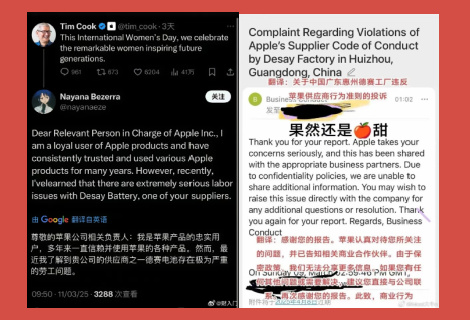
Netizens have recently started reaching out to Apple and its CEO Tim Cook in order to put pressure on a Chinese battery factory accused of violating labor laws. The controversy involves the Huizhou factory of Desay Battery (德赛电池), known for producing lithium batteries for the high-end smartphone market, including Apple and Samsung. The factory caught netizens’ attention after a worker exposed in a video that his superiors were deducting three days of wages because he worked an 8-hour shift instead of the company’s “mandatory 10-hour on-duty.” Compulsory overtime violates China’s labor laws.
In response, the worker and other netizens started to let Apple know about the situation through email and social media, trying to put pressure on the factory by highlighting its position in the Apple supply chain. By now, Desay Battery issued an official statement, admitting to “management oversights regarding employee rights protection” (“保障员工权益的管理上存在疏漏”) and promising to do better in safeguarding employee rights.
It’s an interesting story, and some commentators suggest that it shows that Chinese workers can effectively expose labor violations by reporting them to Western suppliers or EU regulators. But opinions vary. Others are less optimistic about the effectiveness, arguing that companies like Apple would be quick to drop suppliers over product quality issues but more willing to turn a blind eye to labor violations—since cheap labor remains a key competitive advantage in Chinese manufacturing.
💸 From Patriotic Influencer to Tax Evader: Sima Nan Fined More Than Nine Million Yuan

China’s well-known nationalist blogger Sima Nan (司马南) became a trending topic on Friday after being hit with a 9 million RMB ($1.2 million) fine for tax evasion. According to state media, from 2019 to 2023, he underpaid millions of yuan in personal income tax and other taxes by concealing income and submitting false declarations.
Sima responded to media, saying he fully admits guilt. At the same time he’s also blaming the multi-channel network that allegedly was in charge of paying taxes on his behalf at the time.
📌 Noteworthy: Sima Nan promised that- if he’ll still be allowed to have his social media presence – he would in detail explain how he ended up becoming a tax evader. This is kind of funny, because it shows just how good he is in what he does, turning his PR crisis into an opportunity for clicks and views 📈 (yes we do want to know how he went from patriotic influencer to becoming a multi-million tax dodger).
📌Public reaction: The most recurring comments I’ve seen on Weibo is that people are amazed at his high income. They note the hypocrisy of a nationalist, patriotic influencer who’s always preaching truth & justice evading taxes himself, and also conclude that being a nationalist is truly a money-making business🤑🇨🇳
💔 Tragedy at Hubei University: Zhang Yuzhen’s Disappearance and Aftermath

The disappearance of 19-year-old Chinese student Zhang Yuzhen (张钰臻) has captured nationwide attention this week. Zhang did not return after leaving her campus at Hubei University around 5 p.m. on March 15. Her phone remained traceable until 5:54 p.m., about one kilometer from campus. The case became a hot topic as millions of netizens turned into online sleuths, searching for clues that might lead to Zhang’s whereabouts.
On the afternoon of March 20, it was reported that Zhang’s personal items — including her keys and glasses — were discovered by a passerby next to a lake near the university. Police then began searching the lake. By that evening, her remains were found. The case is still under investigation.
There has been some online criticism regarding how the university handled Zhang’s disappearance. Although she was last seen on March 15, it wasn’t until March 18 that her parents were notified by a school counselor. They then reported her missing to the police, after which the school began cooperating with the investigation.
Now, there is also much discussion surrounding the behavior of Zhang’s mother, who has been publicly expressing her grief and anger on Douyin. After learning of her daughter’s death, she became emotionally distraught — screaming, crying, and demanding answers. She seemingly caused some public disturbance when she was prevented from immediately seeing her daughter’s remains, and was also not allowed to leave her hotel (perhaps due to concerns over her emotional state, though details remain unclear at this time). While some online voices have criticized her behavior, many are calling for empathy, arguing that any mother who has just lost her child would be desperate and distraught.
What’s Noteworthy

“The world is so big, I want to go out and see it” (Shìjiè nàme dà, wǒ xiǎng qù kànkan “世界那么大,我想去看看”).
This ten-character sentence became part of China’s collective social media memory after a teacher’s resignation note went viral in 2015. Now, a decade later, the phrase has gone viral once again.
In April 2015, the phrase caused a huge buzz on China’s social media when the female teacher Gu Shaoqiang (顾少强) at Zhengzhou’s Henan Experimental High School resigned from her job. Working as a psychology teacher for 11 years, she gave a class in which she made students write a letter to their future self. The exercise made her realize that she, too, wanted more from life. Despite having little savings, she submitted a simple resignation note that read: “The world is so big, I want to go out and see it.”
The resignation letter was approved, and she posted it to social media.
The letter resonated with millions of Chinese who felt they also wanted to do something different with their life, like go and travel, see the world, and escape the pressures and routines of their daily life. The phrase became so popular that it was adapted in all kinds of ways and manners, by meme creators, in books, by brands, and even by Xi Jinping, who said: “China’s market is so big, we welcome everyone to come and see it” (“中国市场这么大,欢迎大家都来看看”).
This week, Lěngshān Record (冷杉Record), the Wechat account under Chinese media outlet Phoenix Weekly (凤凰周刊), revisited the phrase and published a short documentary about Gu’s life after the resignation and the hype surrounding it.
An earlier news article about Gu’s life post-resignation already disclosed that Gu, despite receiving many sponsorship deals, never actually extensively traveled the world. In the short documentary, Gu explains that she chose to “return home after seeing the world.” By this, she doesn’t mean traveling extensively abroad, but rather gaining life experience in a broader sense. While she did travel, it was within China, including in Tibet and Qinghai.
What truly changed was her life path. She left Zhengzhou and relocated to Chengdu to be near Yu Fu (于夫), a man she had met just weeks earlier by chance during a trip to Yunnan. Six months after the resignation letter, she married him. Together, they ended up opening a hostel near Chengdu, married, and had a daughter.
Gu, now 45 years old, has been back in her hometown of Zhengzhou for the past years, caring for her aging mother and 9-year-old daughter. She is living separately from her husband, who manages their business in Chengdu. She also runs her own livestreaming and online parenting consultancy business.
Although the woman who wanted to “see the world” ended up back home, she has zero regrets about what she did, suggesting her courage to step out of the life she found limiting ultimately transformed her in a meaningful way.
On Chinese social media, the topic went trending on March 19. Most people cannot believe it’s already been ten years since the sentence went trending (“What? How could time fly like that?”). Others, however, wonder about the hopes and dreams behind the original message—and how it all turned out.
💬 “Seeing the world? She just escaped her old life, got married, and had a baby. How is that ‘seeing the world’?” one commenter wondered (@-NANA酱- ).
💬 “The world is so big—what did she end up seeing?” others questioned. “She went from Zhengzhou to Chengdu.”
💬 “Seeing the world takes money,” some pointed out.
💬 But others came to her defense, saying that “seeing the world” also means stepping out of your comfort zone and exploring a different life. In the end, Gu certainly did just that.
💬 “She was quite courageous,” another commenter wrote: “She gave up a stable job to go and see the world. Perhaps her life didn’t end up so rich, but the experiences she gained are priceless.”
The world is still big, though, and there’s plenty left for Gu Shaoqiang to see.
Also read what we wrote about this in 2015: In The Digital Age, ‘Handwritten Weibo’ Have Become All The Rage
What’s Memorable

📚 This pick from our archive is from last year, about Fan Zeng (范曾), the famous Chinese calligrapher, who is turning 87 soon and has a wife 50 years his junior.
This week, some videos featuring Chinese theoretical physicist & Nobel Prize winner Yang Chen-Ning (杨振宁) circulated on social media. Yang is turning 103 this year. Still sharp of mind, and he takes a walk every day.

Yang Chen-ning
In this interview here, when asked about the secret to his longevity, he points to one thing above all: luck.
🍀 Mostly, he suggests it’s the luck of good genes. On his father’s side, diabetes was common, but he was fortunate to inherit his mother’s genes in that regard.
🍚 He also mentions the luck of never experiencing extreme hunger during wartime — he lived in Kunming during those years.
💪 And then he stresses the importance of taking walks, every day, since he was about 70. Keep moving, keep the blood flowing!
What he doesn’t mention, however, is that his wife, Weng Fang (翁帆), is 54 years (!) his junior — I’m pretty sure she helps keep him young too…
Fan and Yang are good friends, and Yang’s good health might have inspired him to marry his 50-years-younger girlfriend last year. Read more 👇
This is an on-site version of the Weibo Watch newsletter by What’s on Weibo. Missed last week’s newsletter? Find it here. If you are already subscribed to What’s on Weibo but are not yet receiving this newsletter in your inbox, please contact us directly to let us know.
Popular Reads
-

 China Insight11 months ago
China Insight11 months agoThe Tragic Story of “Fat Cat”: How a Chinese Gamer’s Suicide Went Viral
-

 China Digital10 months ago
China Digital10 months agoChina’s 2024 Gaokao Triggers Online Discussions on AI
-

 China Arts & Entertainment11 months ago
China Arts & Entertainment11 months agoSinging Competition or Patriotic Fight? Hunan TV’s ‘Singer 2024’ Stirs Nationalistic Sentiments
-

 China Arts & Entertainment12 months ago
China Arts & Entertainment12 months ago“Old Bull Eating Young Grass”: 86-Year-Old Chinese Painter Fan Zeng Marries 36-Year-Old Xu Meng






